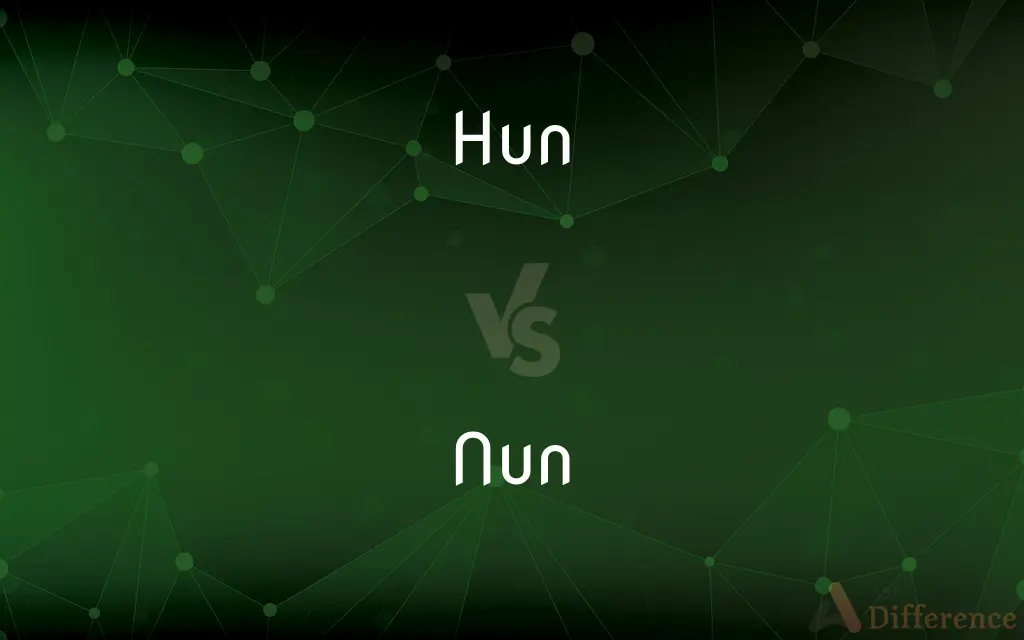Hun vs. Nun — What's the Difference?
By Tayyaba Rehman — Updated on September 24, 2023
"Hun" refers to a member of a nomadic tribe in Asia, while "Nun" is a woman belonging to a religious order, typically living under vows of poverty, chastity, and obedience.

Difference Between Hun and Nun
Table of Contents
ADVERTISEMENT
Key Differences
The terms "Hun" and "Nun" are quite distinct, stemming from entirely different contexts and histories. "Hun" harks back to historical narratives, referring to members of a tribe that historically migrated into Europe from Central Asia. Attila the Hun is a famous leader from this group, who at one point posed a significant threat to the Roman Empire. The Huns, as a tribe, were known for their nomadic lifestyle, skilled horsemanship, and adept warfare tactics.
On the other hand, "Nun" belongs to the religious domain. A nun is a woman who has taken special religious vows, committing herself to a life of worship, service, and often asceticism. Nuns typically reside in convents or monasteries and are members of various Christian religious orders. Their lives are structured around prayer, community, and often charitable works.
While "Hun" evokes images of horse-mounted warriors from ancient history, "Nun" conjures a picture of solemnity, devotion, and religious commitment. It's interesting to note how just a single letter can differentiate two words with such disparate meanings and associations.
In essence, while "Hun" and "Nun" may sound similar, they diverge greatly in meaning, one rooted in historical migrations and conflicts, and the other in spiritual dedication and religious life.
Comparison Chart
Meaning
Member of a nomadic tribe in Asia.
Woman in a religious order, usually living under certain vows.
ADVERTISEMENT
Context
Historical.
Religious.
Example Figure
Attila the Hun.
Mother Teresa was a nun.
Associated Lifestyle
Nomadic, warrior-like.
Monastic, devoted to prayer and service.
Cultural Perception
Often seen as invaders in European history.
Often seen as symbols of devotion and service in Christian cultures.
Compare with Definitions
Hun
Member of an ancient Asian nomadic tribe.
The Hun invasions changed the course of European history.
Nun
A woman member of a religious order.
The nun dedicated her life to serving the poor.
Hun
Often used to refer to Germans, especially during WWI.
Propaganda posters depicted the Germans as the Huns.
Nun
A woman living in a convent under vows of poverty, chastity, and obedience.
The convent was home to twenty nuns.
Hun
A barbaric or destructive person.
Stop acting like a Hun and respect others' property!
Nun
The 14th letter of the Hebrew alphabet.
Nun is a letter in many Semitic alphabets.
Hun
A member of a group of Central Asian nomadic pastoralist peoples who invaded Europe in the fourth and fifth centuries AD and were defeated in 455.
Nun
A character representing the sound of N in ancient Egyptian hieroglyphics.
The symbol for water in hieroglyphics is also called a nun.
Hun
Often hun A barbarous or destructive person.
Nun
A nun is a member of a religious community of women, typically living under vows of poverty, chastity, and obedience in the enclosure of a monastery. Communities of nuns exist in numerous religious traditions, including Buddhism, Christianity, Jainism, and Taoism.
Hun
Offensive Slang Used as a disparaging term for a German, especially a German soldier in World War I.
Nun
A member of a religious community of women, typically one living under vows of poverty, chastity, and obedience.
Hun
A grey partridge.
Nun
Any of a number of birds whose plumage resembles a nun's habit, especially an Asian mannikin.
Hun
One of a warlike nomadic people of Northern Asia who, in the 5th century, under Atilla, invaded and conquered a great part of Europe.
Nun
A woman who belongs to a religious order or congregation devoted to active service or meditation, typically living under vows of poverty, chastity, and obedience.
Hun
A member of a nomadic people who invaded Europe in the 4th century
Nun
The 14th letter of the Hebrew alphabet. See Table at alphabet.
Hun
Offensive terms for a person of German descent
Nun
A member of a Christian religious community of women who live by certain vows and usually wear a habit, those living together in a cloister.
Nun
(by extension) A member of a similar female community in other confessions.
A Buddhist nun
Nun
A prostitute.
Nun
A kind of pigeon with the feathers on its head like the hood of a nun.
Nun
The fourteenth letter of many Semitic alphabets/abjads (Phoenician, Aramaic, Hebrew, Syriac, Arabic and others).
Nun
A woman devoted to a religious life, who lives in a convent, under the three vows of poverty, chastity, and obedience.
They holy time is quiet as a nunBreathless with adoration.
Nun
A white variety of domestic pigeons having a veil of feathers covering the head.
Nun
The 14th letter of the Hebrew alphabet, corresponding in pronunciation to n.
Nun
The 25th letter of the Arabic alphabet, corresponding in pronunciation to n.
Nun
A woman religious
Nun
A buoy resembling a cone
Nun
The 14th letter of the Hebrew alphabet
Nun
A penguin of a former genus.
That bird looks like the nun species I read about.
Common Curiosities
Are Huns and Nuns related in any way?
No, "Hun" refers to an ancient tribe, while "Nun" denotes a religious woman.
Do nuns exist in all Christian denominations?
Nuns are primarily associated with Catholic, Orthodox, and some Anglican traditions.
Why might someone use "Hun" in a WWI context?
It was slang for Germans, used especially in Allied propaganda.
How did the Huns impact history?
The Huns influenced European geopolitics, particularly challenging the Roman Empire.
Were the Huns only in Europe?
No, the Huns originated from Central Asia and later migrated to Europe.
Did the Huns have any religious leaders similar to nuns?
The Huns had spiritual practices and leaders, but not "nuns" as understood in Christian context.
Do nuns interact with the general public?
Yes, many nuns work in the community, though some orders are more cloistered.
Is being a nun a lifelong commitment?
Typically, but nuns can leave the order, though it's a significant decision.
What's the primary role of a nun?
A nun's role varies, but typically centers on religious devotion, community life, and service.
Is "Hun" ever used in modern slang?
In some regions, "hun" is informal slang for "honey," a term of endearment.
Share Your Discovery

Previous Comparison
Wheat vs. Sheaf
Next Comparison
Wattpad vs. PocketbookAuthor Spotlight
Written by
Tayyaba RehmanTayyaba Rehman is a distinguished writer, currently serving as a primary contributor to askdifference.com. As a researcher in semantics and etymology, Tayyaba's passion for the complexity of languages and their distinctions has found a perfect home on the platform. Tayyaba delves into the intricacies of language, distinguishing between commonly confused words and phrases, thereby providing clarity for readers worldwide.
















































